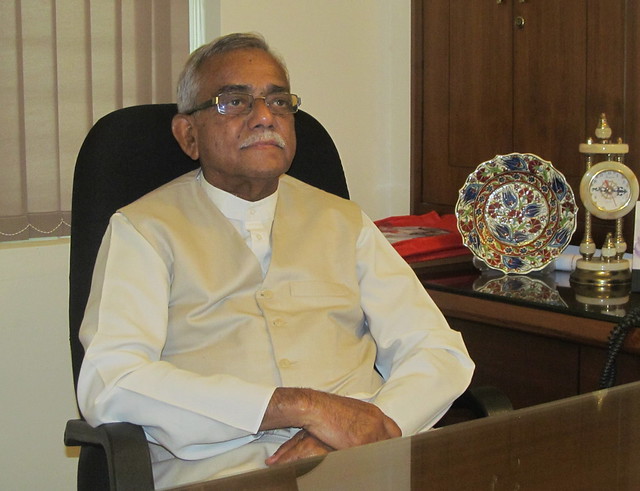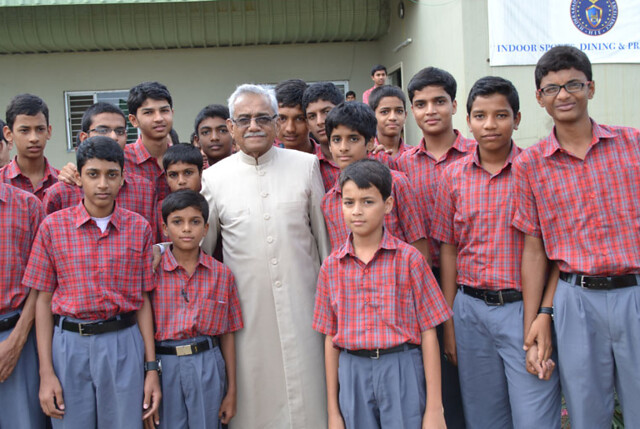Close to 4.5 lakh students from Andhra Pradesh, Maharashtra and Karnataka have benefited from the programme, which amounted to Rs 100 crore of Zakat distribution during last 23 years. “We interview the students before disbursing the scholarships. When you meet these young students, you realize how much they struggle to complete their education,” says Giasuddin Babu Ghan.
By Mohd Ismail Khan, TwoCircles.net,
Hyderabad: From financing a primary school under the shade of a tree to establishing world class higher education institute, Giasuddin Babu Khan has come a long way. And why not?
When the mainstream is still abuzz with debates over how to deliver on corporate social responsibility (CSR), here is a man who – 23 years ago – became a pioneer in the field, that too using Zakat as the instrument of change.
Heir to the legacy of a construction giant, Babu Khan is known today more for his charity work as the chairman of Hyderabad Zakat and Charitable Trust (HZCT), a gentleman from the construction business, who enjoys establishing an educational institute than building a skyscraper.
Even after donning many honorable hats, the septuagenarian remains humble to his core. At his corporate office ‘Babu Khan House’, he devotes more time to HZCT projects than his century-old family business. Result: what started as an experiment to access the impact of centralized Zakat has become his obsession to shape the destiny of the struggling community members!
“We in our family were particular about Zakat, and it was a substantial amount 25 years ago. We thought zakat should be centralized, then only it can be effective,” Babu Khan narrates the beginning of HZCT as a centralized Zakat institution of his family.
Of course, he met with initial resistance. “How can Zakat be centralized, when everybody wants to spend his own money by himself?” was the common refrain. A determined Babu Khan established the trust in 1992 with an initial budget of Rs 11 lakh and since then, there has been no looking back.
Lack of support from other than his family discouraged Babu Khan a bit in the beginning, but he continued relentlessly. The concept of massive centralized Zakat doing concentrated work caught the eyes of many and slowly the contributions increased. The HZCT handles Rs 12 crore per year. As part of Corporate style functioning, the HZCT calls its workers as ‘officers’, 45 of them are in Telangana and 25 in Andhra Pradesh. But one thing was very clear since day one: the objective to educate the underprivileged children and youth.

Giasuddin Babu Khan
The work started with 139 primary schools at village level. It was a difficult job as no teachers were interested to work in the villages and “teachers were pulled from neighboring towns.” Schools were run either in the shade of a tree or from the rooms of a local masjid.
Many people didn’t understand the importance of the education project in the beginning but at the end of the day, the basic literacy programme became quite a success with close to two lakh students getting primary education in villages which have no government facility.
Students were encouraged to go for intermediate education after their matriculation, many toppers among them qualified for engineering and medical seats but they had no money to support their education. Thus, HZCT also began helping deprived but bright students to secure higher professional education through its scholarship programme.
At a time when government scholarship programme was a distant dream; in that scenario Babu Khan engineered a substantial private scholarship programme, providing scholarship to 25,000 meritorious students per year. Close to 4,50,000 students from Andhra Pradesh, Maharashtra and Karnataka have benefited from the programme, which amounted to Rs 100 crore of Zakat distribution during last 23 years. “We interview the students before disbursing the scholarships. When you meet these young students, you realize how much they struggle to complete their education,” he said.
Continued evolution
Not satisfied with just providing platforms for primary and professional education, Babu Khan went ahead with creating ‘Leaders of Tomorrow.’ His Trust started cherry picking bright students through written exam and interview to provide them free coaching for civil services at some premier institutes at Hyderabad. Many of them qualified for prelims but none made it through the final interview.

“We were quite disappointed that students were not succeeding,” Babu Khan accepts candidly while talking with TwoCircles.net. He adds, “When we tried to find out where have those students whom we supported gone we got to know many of them succeeded for top group I state services.”
Then, with an expression of a curious child, he bends over to tell: “Three of our students have been selected for RAW, working in different capacities. I hope you know what RAW is?”
The experience during coaching for civil services taught him one thing: to create the leaders, the exercise should start at the primary level.
Recently, he took the concept of creating the ‘Leaders of Tomorrow’ a notch ahead with his big ticket project: Hyderabad Institute of Excellence (HIE). Spread across a 120 acre campus in Vikarabad town, this is a residential school where qualitative education is provided to brilliant students from marginalised families. Students from remote villages with good academic records are admitted and provided full scholarship.”
Currently in its second year, the HIE has already received accolades. Its large pamphlet splashes faces of students with their economic background and their academic achievement. S M Touseef, son of a watch repairer, scored 98% in MPC (Mathematics, Physics, Chemistry); so is Shaikh Imran, whose father works in a paan shop. Another student Vannur Valli scored 98% in BiPC (Biology, Physics, Chemistry), his father is an agricultural labour; so on and so forth. More than 250 students who are studying in class 11 and 12 are also receiving coaching for entrance exams for professional courses. It was a higher secondary school, but now a secondary school too has begun.
Depending on charities even for something basic such as education is a sad state of affairs for the Muslim community, Babu Khan acknowledges but maintains that the answer to all the problems of the community remains in ‘education’. And, counting on his experience from the field for over two dozen years, he claims this fact is now understood even at the grass root level. “The community has become very conscious at the lowest level, even in a small village, that they must educate their child … this is the only answer.”
For instance, his Trust has 3,800 widows with 6,600 orphans under the orphan care project. Almost all those orphan children are studying in government schools. “Can you believe it? A widow, who doesn’t have proper food to eat, is sending her children to school. That shows there is now awareness for education.”

As his clients were waiting outside to meet him, the obvious question was, how long will he keep sailing on two boats? “This (HZCT) is more enjoyable than doing business,” pat came his one liner. “In business you work for prospective profit. In this field, there is an assured profit from Allah, as simple as that, this work is more satisfying for me.”
After such a long fruitful journey, ask him about future plans, Babu Khan humbly plays it down: “I have tried to create an asset for the community, let the future generation decide what they want to do with it.”
Related:

